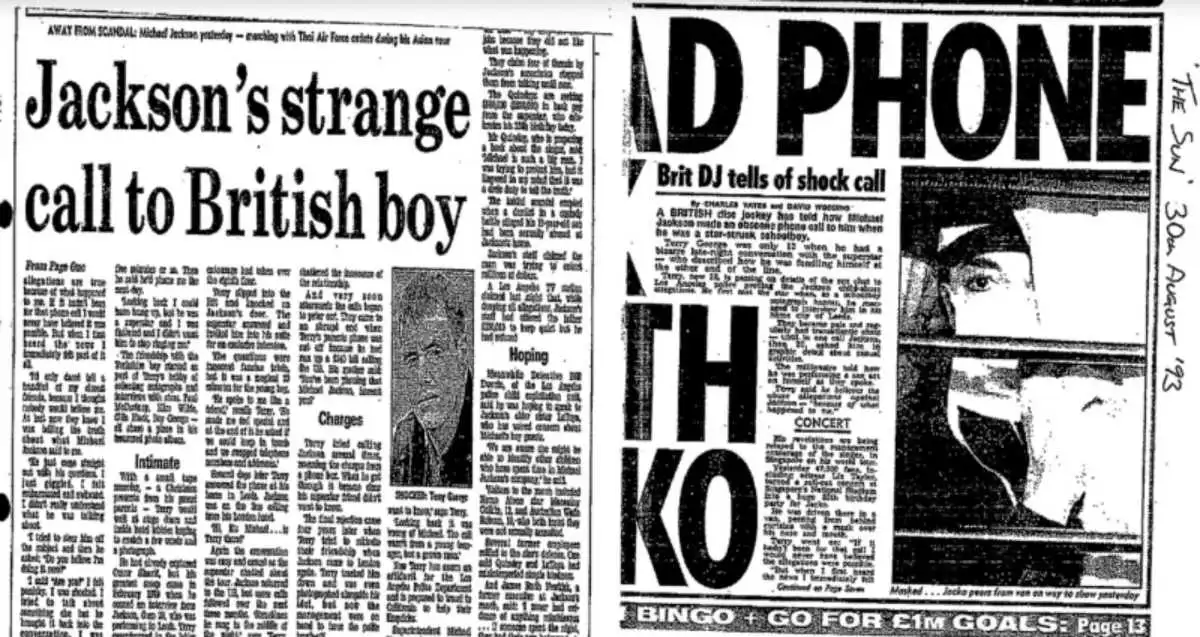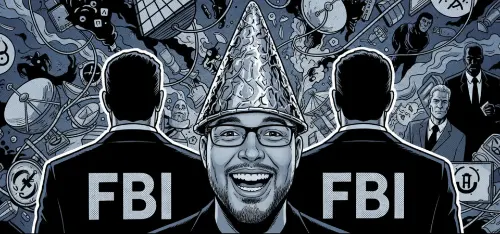The Truth About The FBI's Role in the Michael Jackson Investigations

Mar 14, 2019
For many years, a widely circulated claim has done the rounds online, alleging that the Federal Bureau of Investigation (FBI) conducted a decade-long investigation into Michael Jackson and ultimately found no evidence linking him to the sexual abuse of children.
But is there any truth to this?
At first glance, the claim appears credible. The FBI’s website hosts a dedicated page on Michael Jackson, which links to numerous related documents. These files were made public in December 2009, shortly after Jackson’s death. Of the 679 pages in total, 333 were released, while the remainder were withheld to protect the privacy and security of active agents.
When picturing an FBI investigation, one might expect extensive surveillance, detailed interviews with key witnesses, and comprehensive evidence gathering. However, a brief review of the released material shows that these documents fall far short of providing a clear vindication of Jackson’s “innocence”. Many pages are heavily redacted, others are barely legible, and some even consist of clippings from tabloid newspapers — as illustrated in the screenshot below.

Pinpointing the exact origin of the theory that the FBI conducted an investigation which ultimately cleared Michael Jackson’s name is difficult, although many of his supporters would like to believe they played a part in its spread. One such figure is Brian Oxman, the long-standing — and now disbarred — lawyer for the Jackson family. Ironically, Oxman was also responsible for promoting the unfounded rumour that the substantial settlement with Jordan Chandler was paid not by Jackson himself, but by a mysterious insurance company — a claim that was, in fact, false.
In an interview on Good Morning America, Oxman stated that he first became aware of the existence of an FBI file on Michael Jackson in August 2009. This discovery, he said, prompted him to submit a Freedom of Information Act request in an effort to secure the release of the files.
Watch the segment below.
In summary, the video makes clear that it is not unusual for public figures to have FBI files. In many cases, these files are unrelated to any alleged criminal activity on the part of the individual concerned, and instead document investigations into people who may pose a threat to them.
In 1992, for example, the FBI launched an investigation into Frank Paul Jones, a man with bipolar disorder who had become obsessed with Michael and Janet Jackson. Jones had issued threats against both Jackson and then-President George H. W. Bush, culminating in his arrest outside the Jackson family’s Hayvenhurst estate. The FBI was also involved in assessing the risk of a potential terrorist attack during Jackson’s 2005 trial.
Brian Oxman has been keen to present the recently released FBI files in a favourable light, claiming that the Bureau carried out extensive international investigations and found “not one scrap of evidence that Michael Jackson ever harmed a child.”
By contrast, former FBI agent Brad Garrett offers a sharply different perspective in the video, stating:
When you look at the files that have become available, they are files where the FBI has been asked by the police to help them with certain aspects of the case. They are really not operational FBI cases. For example, coming to the FBI because they have forensic capabilities with computers — to mirror-image hard drives so they can look at the evidence inside of a computer — or asking for investigative strategies or interview strategies. So these really are support functions where the FBI were involved in the case. The other side, of course, are the threats, which were operational cases.
Brad Garrett stresses that there was never an active FBI investigation specifically targeting allegations of child sexual abuse. Instead, the Bureau’s role was limited to assisting local law enforcement in areas outside their expertise — for example, analysing hard drives and VHS tapes seized from Jackson’s properties.
This account is consistent with information published on the FBI’s website, which states:
Michael Jackson (1958-2009) was a famous singer and entertainer. Between 1993 and 1994 and separately between 2004 and 2005, Jackson was investigated by California law enforcement agencies for possible child molestation. He was acquitted of all such charges. The FBI provided technical and investigative assistance to these agencies during the cases. The Bureau also investigated threats made against Mr. Jackson and others by an individual who was later imprisoned for these crimes. These investigations occurred between 1992 and 2005.
It is worth noting that, according to the FBI, Michael Jackson was investigated by California law enforcement agencies — specifically the Santa Barbara and Los Angeles police — with the Bureau providing only technical and investigative assistance during the 1993 and 2005 cases.
The FBI even released a podcast to make it explicitly clear that its role did not extend to conducting an investigation into Jackson himself.
Untrue. The FBI did not investigate MJ, even for a day. “That’s Dave Hardy, chief of the FBI’s Freedom of Information Program, who says that while FBI didn’t investigate Jackson, the files now available show the FBI working with other agencies.
Moreover, the FBI files show that the Santa Barbara Sheriff’s Department requested the Bureau’s assistance in analysing 16 computers, along with associated digital media, seized from Neverland Ranch.
Santa Barbara Sheriff's Department has requested assistance processing computers and related media relating to the Michael Jackson case. SBSD has requested examiners with [retracted] backgrounds.
The FBI confirms that the analysis was carried out in the Santa Barbara Sheriff’s Office laboratory, under its direct supervision.
Dear Sheriff Anderson:
Enclosed is the Computer Analysis Response Teem (CART) report of examination on sixteen Macintosh computer hard drive images related to the captioned case. In accordance with your request, the examination was conducted in the Santa Barbara Sheriff's Office laboratory under the investigative supervision of your detectives.
The Santa Barbara County Sheriff’s Department also expressed its gratitude to the FBI for the assistance provided.
On behalf of the Santa Barbara County Sheriff's Department, Criminal Investigations Division, I would like to thank you, Special Agent [retracted] and those involved in the Computer Analysis Response Team who worked to diligently examine the Macintosh hard drive images and quickly provide to us a report for the lead detectives involved in the above referenced case (your file 62D-LA-236081).
Sheriff's Department Detective [retracted] and Detective [retracted] worked alongside Agent [retracted] Agent [retracted] and Agent [retracted] stating that your staff are truly experts on what they do. Their assistance in this matter was greatly appreciated."
Sincerely,
Jim Anderson
Once again, this dispels any suggestion that the FBI conducted a covert or independent investigation into Jackson for child sexual abuse. The official records make it clear that the Santa Barbara Sheriff’s Department requested the Bureau’s expertise to analyse computer hard drives and digital media — work carried out under the department’s supervision due to the technical complexity involved.
Did the FBI Clear Jackson of Possessing Child Pornography?
Some fans claim that the FBI cleared Michael Jackson of possessing child pornography on his computers. However, as outlined above, this is not accurate. The final determination rested with the Santa Barbara Sheriff’s Department, whose own records documented questionable material found on his devices. While none of it was illegal, it was certainly not what one might expect from someone who publicly cultivated the image of an innocent, Peter Pan‑like man‑child.
For example, a Macintosh PowerBook G3 laptop, discovered in Jackson’s master bedroom, contained 21 graphic nude images of females sourced from a “teen sex” website.
Similarly, a Mac G4, also located in the master bedroom, held 19 graphic nude images of females, along with a browsing history showing visits to child adoption websites such as adoptablekids.com and adoption.com.
These two adoption websites could arguably be classified as “child erotica”. When Jackson’s computers were seized in 2003, both sites contained hundreds — if not thousands — of images of children, many of them preteens. Archived versions of these sites can still be viewed via the Wayback Machine (Link 1 and Link 2).
Another Power Mac G4, again found in Jackson’s bedroom, contained 10 images categorised as “teenage sex” material, as well as documentation of a user ID: “Kings 777 TUT / privacy 969.”
Read the document here.
The likelihood of Jackson storing illegal videos or images on his computers was relatively low. Most of the devices had small hard drives, ranging from 1 GB to 80 GB — for context, a single DVD holds 4.7 GB.
In 2003, internet speeds were also far from ideal for streaming or downloading large video files. DSL and cable modems were only just becoming mainstream, with speeds between 256 kbps and 1 Mbps — well below the 2–3 Mbps typically required to stream an HD film today.
Furthermore, the Dark Net — now a common source for illegal material — did not exist in its current form at that time. While there is no definitive date marking its emergence, the Tor Browser, which enables access to it, was not released until 2008.
Why are fans falsely claiming the FBI investigated him?
Regrettably, this is a common tactic among Jackson’s most ardent supporters. They circulate false information and promote conspiracy theories in an effort to reinforce Jackson’s “innocence” — or at least the perception of it. The claim that the FBI conducted an investigation extends well beyond fan websites and social media; it has been repeated on national television by fans and even by members of Jackson’s own family.
A notable example is Danny Oliver (@DannyMJOliver), a long-standing and vocal supporter of Jackson. He appeared on the UK programme This Morning shortly before the release of Leaving Neverland, where he outlined his reasons for believing Jackson was innocent. Near the end of the interview, he stated:
Let me tell you now, there's been a ten-year FBI investigation into Michael Jackson — hundreds and hundreds of pages of documents and evidence presenting the facts that he did nothing untoward.
Watch the segment below.
Around the same time, Michael’s nephew, Taj Jackson, told BBC reporter Kirsty Wark that his uncle was, in his view, the most scrutinised person in the world at that time. He even referred to secret FBI raids which, he said, had uncovered no incriminating evidence.
Taj Jackson remarked:
He definitely had a lot of power in the industry, but at the same time, when you're the most scrutinised person in the world at that point — wiretaps and this and that, FBI raids, secret FBI raids when he's out of town — it's like they would have found something. They found nothing.
Watch the segment below.
Even on his GoFundMe page — where he is seeking $777,000 to fund his pro‑Michael Jackson documentary — Taj Jackson has repeated this claim. Although GoFundMe’s terms and conditions explicitly prohibit false or misleading statements in campaign descriptions, he appears undeterred.

Another steadfast defender of Jackson, Charles Thomson, has made similarly bold — if not more audacious — claims in a blog post from January 2010. In his article, titled “FBI Files Support Jackson’s Innocence; Media Reports Otherwise”, Thomson goes on to state:
On a more general level, the files reveal that it was not only the Los Angeles Police force which pursued Jackson for more than a decade and failed to produce one itoa of information to connect the star to any crime - it was the FBI too. That Jackson's life was dissected and his behaviour was investigated for more than 10 years by two major law enforcement agencies and not one piece of evidence was ever produced to indicate his guilt speaks volumes.
He repeats this on his Twitter account in January 2019.
Imagine having to put up with this bullshit, about one of your relatives, for decades. I don't know how this family keeps soldiering on. They can't get any justice. Five-month trial ending in acquittal, plus a 10-year FBI investigation that found nothing - and still it goes on.
Charles Thomson’s claims are flawed on two counts. First, the FBI did not investigate Jackson at any point. Second, the Santa Barbara and Los Angeles departments gathered sufficient evidence to bring charges against him for child sexual abuse. While there may not have been a “smoking gun” — as is often the case in sexual assault investigations — dismissing his behaviour towards young boys in such a cavalier manner does little to enhance perceptions of Thomson’s moral integrity.
Conclusion
Oddly, those who claim that the FBI investigated Jackson and found no evidence of child abuse are unable to cite a specific reference page. Instead, they deflect, directing people to the homepage and expecting them to locate the alleged “exonerating” information themselves.
These same individuals also fail to acknowledge that, if the FBI had indeed investigated and exonerated Jackson, it would highlight serious failings within the U.S. justice system. Why would a government agency withhold crucial information from a judge and jury, thereby allowing the state of California to squander millions of taxpayer dollars prosecuting a man they supposedly deemed innocent? Unsurprisingly, fans, family members, and former lawyers avoid such questions — they require far too much common sense.
Perhaps the most far‑fetched claim from Jackson’s supporters is that the FBI investigated him continuously for more than a decade. They seize on the statement that “these investigations occurred between 1992 and 2005” without recognising that the child sexual abuse‑related inquiries — in which the FBI merely provided assistance — took place in two distinct periods: 1993–1994 and 2004–2005.
Yet the deepest irony lies in a report buried within the files: a Toronto couple alleged that they had witnessed possessive behaviour and heard disturbing sounds coming from Jackson’s train compartment while he was accompanied by a boy, thought to be around 12 years old, whom he referred to as his “cousin”.
The report states:
P/R called from Toronto Canada. She & husband works (sic) in Children's Services.
On Sat 3-7-92 they took train from Chicago to Grand Canyon. Train continued to CA (California). They had a compartment on car that Jackson had four compartments.
Jackson had a M/B juv (male black juvenile) 12/13 with him along with adult staff. Boy ID'd as Michael's "cousin". Jackson was very possessive of boy at night. P/R heard questionable noises through wall.
She was concerned enough to notify the conductor of her suspicions.
What makes this report particularly significant is that the initial concern was raised with the conductor in 1992 — a year before Jordan Chandler accused Jackson of child molestation. At that time, there were no widespread or sensational suspicions about Jackson, nor about his practice of sleeping behind closed doors with young boys. He was certainly regarded as an eccentric, but not as a suspected child predator.
A common claim made by Jackson’s supporters is that those who accuse him of criminal or questionable behaviour are always motivated by financial gain. In this instance, however, the couple did not sell their story to the press or seek publicity. Instead, they quietly reported their concerns through the appropriate channels.
Does this prove that Jackson was molesting the unidentified boy? No — of course not. However, when the Chandler allegations became public in 1993, the couple — or at least one of them — contacted law enforcement to report that they had previously raised concerns about Jackson’s behaviour towards a boy on a train they were travelling on. It seems unlikely they would have taken this step unless their initial suspicions had led them to believe Jackson was engaging in sexual, or at the very least deeply inappropriate, behaviour with the child. Seeing Jackson on the news, and learning of the accusations against him, likely reinforced their original concerns.

